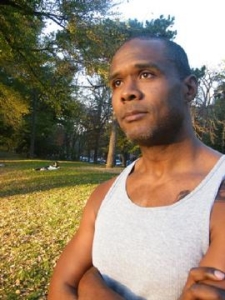 James Hannaham’s Delicious Foods is a harrowing tale of modern-day slavery on the fringes of everyday life. The untraditional narrative follows Darlene and her son Eddie’s attempts to free themselves and their fellow laborers from a debt slavery scam. One laborer, a former hip-hop hopeful who calls himself Sirius, muses in the fields about a diamond planet in the sky, while the plantation’s white overseer, Sextus Fusilier, enlists Eddie’s efforts in helping to keep a computer running in the crumbling big house. Things get more keen from there. Via email, I discussed the genesis of Delicious Foods with actor, performance artist, and novelist Hannaham.
James Hannaham’s Delicious Foods is a harrowing tale of modern-day slavery on the fringes of everyday life. The untraditional narrative follows Darlene and her son Eddie’s attempts to free themselves and their fellow laborers from a debt slavery scam. One laborer, a former hip-hop hopeful who calls himself Sirius, muses in the fields about a diamond planet in the sky, while the plantation’s white overseer, Sextus Fusilier, enlists Eddie’s efforts in helping to keep a computer running in the crumbling big house. Things get more keen from there. Via email, I discussed the genesis of Delicious Foods with actor, performance artist, and novelist Hannaham.
J.T. Price: To quote from the book for the benefit of our readers, your protagonist Eddie speaking: “Set an obstacle in a man’s way and he can see his whole life differently — not that everybody in my position could’ve done what I did.” Delicious Foods begins with what I’d call an unlikely success story, or at least what appears to be success, while American up-by-the-bootstraps, you-can-do-it-too lore haunts the pages from first to last. Darlene, as she descends into drug addiction, clings to lessons drawn from a self-help book. On the farm, where she and Eddie are confined, a form of modern-day slavery is passed off under the rubric of work leading to betterment. So, the novel seems to offer both ironic and, if we believe in Eddie’s pluck, redemptive fare on the value of hard work. Can you speak to the way the self-improvement paradigm occupies the heart of this book?
James Hannaham: It’s not so much that the self-improvement paradigm occupies the heart of the book; that makes it sound as if I’m trying to propagate self-improvement clichés rather than investigate and question them.
Not my intent. Point taken, though.
I mean it isn’t false to say that hard work pays off, the problem is that hard work also requires a kind of ‘soil’ to grow in, wouldn’t you say? Hard work by itself in an environment without any support system, or with a system rigged toward the failure of the individual for the profit of the institution, the way it is at Delicious Foods, is useless, like a car trying to get out of a block of ice by spinning its wheels. Eddie is exceptionally determined, in part because he has to be since his parents aren’t there for him at all, but until he gets to St. Cloud he really doesn’t have a productive place to put all that energy and skill. And the farm is about to exploit the hell out of him because they can tell he has all that potential but has not yet been indoctrinated or corrupted in the way that will be necessary to have a leadership role at a place like Delicious. If I’m trying to “say” anything through that scenario, it’s that the context in which hard work happens is as important as the hard work itself, essentially, and can make the whole difference between various types of success.
“I smiled at her with no face and fizzed and popped like usual, filling up the insides of the pipe with some thick-ass smoke.” An impressive and kind of fun-sounding and also horrifying line. Contrasted with success, however defined or problematic, there’s the nightmare of addiction. Scotty, aka crack-cocaine, memorably narrates the sections centered around Darlene. How easy, or difficult, was it arriving at Scotty’s voice?
It happened sort of by accident. I was trying to avoid using the first person while telling Darlene’s story for a couple of different reasons: a) it felt a little dishonest to try to tell the story of someone who was obviously really out of it in prose that needed to be perceptive and have a high degree of recall and judgment, and b) doing so would also diffuse some of the drama, since you’d be able to discern just from the tone that the character had come through it and wound up okay on the other side of the addiction. So I started writing this close third in a sort of trashy voice, thinking that Darlene would be a different kind of character in terms of class, someone who hadn’t fallen quite as far as she turned out to in later drafts.
Things were actually worse for Darlene in earlier drafts?
No, initially I thought she might not have gone to college and that she would’ve been a prostitute for a longer time. And once I re-thought who Darlene was, I was left with the question of whose voice was speaking those lines. I’d really enjoyed writing the voice so I was a bit reluctant to let go of it. And then I thought — Oh my god, it’s the drug talking! I had two thoughts right after that. The first was, Uh-oh, nobody’s going to like that. And the second was, Well, nobody except Victor LaValle. And I prefer to work that way, thinking not of audience as a large group of people I don’t know but in terms of specific friends or colleagues who might get a kick out of particular moves or jokes or situations I’d come up with. So that was that. Scotty stayed in the picture. I toyed around with the voice a little bit; at one point I had a question about whether or not Scotty should really speak in the African American vernacular at all, whether that wasn’t just perpetuating shit I didn’t want to perpetuate, so I imagined for a while that Scotty was pretentious, you know, that it wanted to be high-class cocaine, so it kept trying to class up its act, like talking in a fake accent or what have you. But that idea failed big time. I mean, when it came down to it, I was like, Where would crack cocaine learn to talk from if not black Americans? Unfortunately.
On a not entirely unrelated note, bathos amid pathos, and the sometimes uncomfortable relation between the two manners of experiencing life, seems to spring up again and again in your work. The quality of reality in Delicious Foods isn’t quite of this world — details of the farm don’t strictly adhere to reported facts, but they’re not wildly far out either, like, say, a Vonnegut outer space allegory. Numerous echoes of this country’s troubled past, and of the American South, surface in a sort of affecting, semi-hallucinatory fashion. The question here: in writing fiction, what fealty does a novelist owe present-day injustice when every representation depends on artifice?
Right. There’s a term for what I’m going for, the “minimally counterintuitive.” People seem so interested in dystopic fiction these days, but isn’t that because we live in an actual dystopia in various ways, a surveillance state, or at least we who live in the various bubbles of wealth and/or education of the world are nevertheless conscious, and sometimes very self-conscious of the fact that somewhere out there are some pretty awful dystopias where actual people are picking our coffee beans and assembling our iPhones and sewing our shirts together? The technique that Delicious uses to recruit and enslave people — often American citizens, but foreign nationals from Central America and elsewhere get this kind of abuse in even larger numbers — actually is based on real incidents of modern slavery. I keep forgetting that not everyone might realize that. I guess what I’m saying is that I’m interested in that murky zone where the truth is so outrageous as to be unbelievable, and in tackling the challenge of translating that sense of barely real truth into fiction without sacrificing its impact. And given the kind of research I did into human trafficking and specifically debt slavery scams, the story of what happens at Delicious Foods is, sadly and shockingly, not even close to the worst of what I’ve read that’s happened to actual human beings, and continues to happen to them while we stare at our phones.
And in regard to the fealty owed by representations of outrage?
Fiction is the lie that tells the truth, right? I wanted this book to evoke the quality of myth at the same time as it describes an injustice that seemed by nature almost out of time. The story that gave me the germ of the book was a true account of a black woman named Joyce Grant who was enslaved in Florida in the 1990s — yes, 1990s — that appears in John Bowe’s book Nobodies. It gave me a feeling I have since called “temporal dread,” a fear that time was not progressing at all with regard to human nature. The same exploitation was happening to people of the same demographic in the same location! What!? Are we just fucked as a species?
Maybe questions of craft will save humanity. The book hosts a true range of characters, many memorably named. How do you go about accomplishing the task of naming? Written in stone from the outset? Evolving as the story grows? By consulting great works? Asking friends?
It’s a pretty long process. Darlene had some other name very early in the process, and she and Eddie had a different last name but then weirdly one of my students turned in a story where her protagonist had that same last name, not a very usual one, and this was long before I’d told anyone what I was writing or shown them anything, and that weirded me out. I think just about everyone’s name changed at least twice. I ended up naming Darlene after Darlene Love, actually, another black woman whose labor was famously stolen. Eddie, I think was always Eddie but maybe not Edward. Nat was always Nat, too, because it’s one of those names that recalls the past in a multivalent sort of way, from Nat King Cole to Nat Turner to Nathaniel Hawthorne or Nathan Hale. I changed a character’s name from Cleveland because I kept worrying that I’d gotten it from The Cleveland Show, so I changed his name to a different city in Ohio called Fremont.
More with respect to character development, does your background as a performer with ERS guide the way you inhabit one? How do you experience the differences and similarities in the disciplines of acting and writing?
Kind of, sure, but it’s been going on much longer than ERS, to when I was like five years old and just trying to amuse my family. I am not quite comfortable with the term “inhabit” when it comes to fiction because the character in that case is made of words rather than words plus the actor’s physicality and vocal ability, etc., the way it occurs onstage. As a novelist you have a lot more opportunities to comb through the language and make the language represent the character faithfully; in performance you don’t have the ability to realistically represent someone you don’t resemble. Though it can be fun to unrealistically represent characters you have no business pretending that you resemble.
Any examples that come to mind?
In the last ERS show I worked on, Highway to Tomorrow, I played a chorus of Asian women.
That giant diamond in space. How did it find its way into the pages of your novel?
I read a lot of news articles during the 7 or 8 years it took to write Delicious Foods, and I kept a file of things that I thought might be useful. One story was a science article about BPM 37093, a collapsed star that might also be a diamond, and it seemed to me both like one of those things that’s too weird to be true even though it is, and potentially symbolic of a lot of people’s relationship to certain of their aspirations (I’ve been that person myself, even), especially when they’re truly down and out, like the folks on the farm. To the point where the thing you want is quite obviously and even painfully unattainable, and yet you’re like, I want that! And you even tell people about how you want it. Maybe I saw Sirius’ desire to get to BPM 37093 as a metaphor for my own eight-year search for a full-time tenure-track job teaching creative writing.
Another outer space question then: Do you know anyone who would seriously consider moving to Mars?
Yes, speaking of the tenure track, but it depends on the salary and benefits package.
OK, if you don’t mind, for my final question, although not really a question, I’m just going to Chris Farley Show a passage from late in the novel:
“It made her think of everything in her own past that had brought her to Delicious and that she wanted to reverse, and how the light from the stars had come from long before the time she had been with her son, even from before the time when Nat had been alive. Only then could she faintly accept the romance of it; of human beings, all by themselves on a wet rock in an outpost of a universe whose size they couldn’t comprehend, staring into the heavens to make primitive pictures in the air based on lights that might not even exist anymore.”
That’s awesome.
“Yes,” as my old professor Lars Gustafsson said to someone who complimented one of his stories, “How did I do that?”
J.T. Price’s work has appeared in The New England Review, Electric Literature, Opium Magazine, The Daily Beast, BOMB, Seven Days, The Los Angeles Review of Books, and The Millions, among other publications. For more, visit www.jt-price.com.
This post may contain affiliate links.







